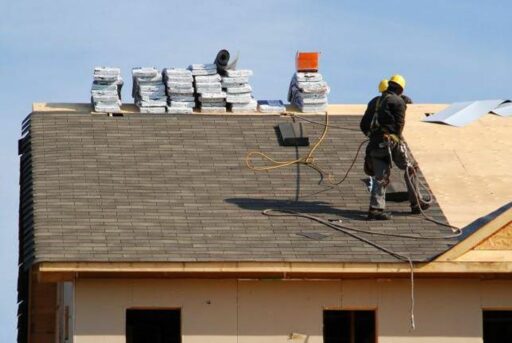Choosing the right roofing contractor is crucial for a successful roof replacement or repair. This blog post will equip you with the top questions to ask roofing contractors, ensuring you select a trustworthy professional with the necessary credentials, experience, and support for your project. We’ll delve into verifying contractor credentials, understanding the scope of work, evaluating the financial aspects, assessing communication and support, and spotting potential red flags.
Key Takeaways
- Verify the roofing contractor’s licensing and insurance to ensure they meet state requirements and provide liability coverage.
- Discuss the project’s scope, including a detailed assessment, timeline, and how unexpected issues will be managed.
- Get a clear estimate and understand the payment terms, as well as the warranty and guarantee policies for the roofing work.
- Evaluate the contractor’s project management and communication practices, including their on-site support and post-installation follow-up.
- Be wary of high-pressure sales tactics, vague contracts, and contractors without local references or positive reviews.
Verifying Contractor Credentials

Licensing and Certification
Before hiring a roof contractor, it’s essential to verify their licensing and certification. Each state has distinct requirements for contractors, and it’s your responsibility to ensure that the contractor you’re considering meets these standards. A valid license is a testament to the contractor’s knowledge of local building codes and regulations, which is crucial for the safety and legality of your roofing project.
- Check State Requirements: Different states have different licensing requirements. Confirm that the contractor’s license is current and valid in your state.
- Certification of Installers: Certified installers are more likely to adhere to high standards of quality and professionalism. They are trained to use the right materials and provide accurate quotes.
- Insurance and Bonding: Ensure that the contractor is insured and bonded to protect yourself from any potential accidents or damages during the roofing process.
It’s not just about having a license; it’s about what that license represents. A licensed contractor is more likely to deliver a project that meets your expectations and complies with local safety standards.
Insurance and Bonding
Ensuring that your roofing contractor is adequately insured is a critical step in protecting your property and finances. Ask your contractor if they carry general liability and workers’ compensation insurance. This coverage is essential as it protects you from being held liable for accidents or damages that occur on your property during the project.
When discussing insurance, it’s important to understand the specifics of the coverage. Here’s a quick checklist to guide your conversation:
- General Liability Insurance: Covers property damage and bodily injury caused by the contractor’s operations.
- Workers’ Compensation: Provides benefits to employees who get injured on the job.
- Bonding: Secures your investment if the contractor fails to complete the job or meets contractual obligations.
Ensure that the contractor can provide evidence of insurance and bonding. Request to see the actual certificates and verify that they are current and sufficient for your project’s scope.
Understanding the insurance claims process is also vital. In case of an incident, you should know how to file a claim and what the process entails. Clarify these details with your contractor to avoid any surprises or delays in the event of an unforeseen issue.
Experience and Past Projects
Assessing a contractor’s experience and past projects is crucial in determining their capability to handle your roofing needs. A seasoned contractor with a solid track record is more likely to deliver consistent, high-quality work and address any issues that arise with greater expertise.
- Inquire about the duration of their business operations to gauge their industry experience.
- Request a portfolio of past projects to evaluate their work quality and relevance to your project.
- Ask for local references or testimonials to verify their reputation and customer satisfaction.
It’s wise to invest in a contractor’s experience over simply choosing based on pricing. Experienced contractors bring a level of reliability and creativity to problem-solving that can save time and money in the long run.
Understanding the Scope of Work

Detailed Project Assessment
A detailed project assessment is crucial for setting clear expectations and avoiding future disputes. Your roofing contractor should provide a comprehensive evaluation of your roofing needs, including an inspection of the current roof condition, identification of any issues, and a clear outline of the required work. This assessment forms the basis for the project’s scope, materials needed, and the overall strategy for execution.
It’s essential to ensure that the project’s scope is well-defined and agreed upon before any work commences. A thorough assessment helps in identifying potential challenges and planning for them accordingly.
Make sure to ask for a written estimate that includes all aspects of the project. This should cover labor, materials, and any additional charges that might arise. A detailed estimate promotes transparency and helps in preventing misunderstandings or unexpected costs as the project progresses.
Questions to Consider:
- Are all necessary repairs and replacements included in the assessment?
- How will the contractor handle unforeseen issues that may arise?
- Is there a clear understanding of the roofing materials to be used?
Timeframe and Scheduling
Understanding the timeline for your roofing project is crucial for planning your daily life around the construction. It’s important to discuss with your contractor not just the start and end dates, but also how they handle unexpected delays, such as inclement weather or unforeseen structural issues.
- Start Date: When will the project commence?
- Completion Date: What is the targeted end date?
- Contingencies: Are there plans for unexpected delays?
By discussing these points, you ensure a clear schedule is set, which helps in minimizing disruptions to your routine.
Remember to inquire about how the contractor plans to prioritize tasks, especially those that are time-sensitive or weather-dependent. This will give you insight into their project management skills and ability to deliver on time.
Handling of Unexpected Issues
When embarking on a roofing project, it’s crucial to discuss with your contractor how they handle unexpected issues that may arise. These can range from unforeseen structural damage to delays caused by inclement weather or labor shortages. A reputable contractor should have a clear contingency plan in place to address such challenges without significant impact on the project timeline.
- Unforeseen structural damage
- Labor availability
- Permit acquisitions
It is essential to establish a communication protocol for these situations, ensuring that you are kept informed and involved in any decision-making process. This transparency is key to maintaining trust and ensuring the project stays on track despite any hurdles.
Ask your contractor about their strategies for early detection of potential problems, such as regular inspections that can reveal hidden damages. Additionally, inquire about their readiness to mobilize services like pest control or handymen for quick fixes. Understanding these aspects upfront can save you from headaches and additional costs down the line.
Evaluating the Financial Aspects

Estimates and Quotations
When it comes to roofing projects, a clear and comprehensive estimate is crucial. Ensure that the estimate is detailed, covering all aspects of the job, including materials, labor, and any potential additional costs. This clarity upfront can prevent disputes and unexpected expenses as the project progresses.
Be wary of low quotes that may indicate subpar materials or workmanship. It’s essential to balance cost with quality, and sometimes the cheapest option can end up being more expensive in the long run due to repairs and replacements.
Transparency in the estimation process is key. A reputable contractor will provide a written estimate that itemizes costs, which aids in avoiding misunderstandings.
Remember to compare estimates from different contractors. This not only helps you gauge the market rate but also allows you to assess the value offered by each contractor. Here’s a simple checklist to consider when reviewing estimates:
- Quality of materials
- Scope of work
- Labor costs
- Timeline for completion
- Additional fees or charges
By taking these steps, you can ensure that you’re making an informed decision and investing in a roofing solution that meets your needs and budget.
Payment Terms and Conditions
Understanding the payment terms and conditions is crucial when hiring a roofing contractor. It’s important to inquire about the payment schedule and ensure that the terms are clear and agreeable to both parties. Look for contractors who offer transparency and flexibility to accommodate your budget while ensuring fair compensation for their services.
Transparency in payment terms is a hallmark of a reputable contractor. It reflects their commitment to integrity and customer satisfaction.
If you are replacing your roof as part of an insurance claim, verify that the contractor is knowledgeable about insurance claim laws. Quality roofing contractors like Joe Laws Roofing, Jonick LLC, and JOSEPH ELIA GENERAL CONSTRUCTORS offer exceptional service, increase property value, and provide financing options for roof repairs and installations.
Here is a brief overview of what to consider regarding payment terms:
- Initial deposit requirements and percentages
- Progress payment milestones
- Final payment upon completion
- Methods of payment accepted (e.g., check, credit card, financing)
Always ensure that the payment terms are documented in the contract to avoid any misunderstandings or disputes.
Warranty and Guarantee Policies
When selecting a roofing contractor, understanding the warranty and guarantee policies is crucial for long-term satisfaction. A professional contractor should offer both a workmanship warranty, which covers installation errors, and a manufacturer’s warranty for the roofing materials. It’s important to ask for detailed written information about the coverage scope, duration, and the process for filing a warranty claim.
- Workmanship Warranty: Covers installation errors
- Manufacturer’s Warranty: Covers roofing materials
Ensure you are clear on the conditions under which a warranty claim is viable. For example, some warranties may be voided if the roof is not maintained according to the manufacturer’s guidelines. Additionally, verify the length of the warranty period; a longer warranty is often indicative of a contractor’s confidence in their work.
Remember, not all warranties are created equal. The terms and duration can vary significantly, so it’s essential to understand what is included and what isn’t.
Lastly, inquire about the contractor’s policy for addressing issues post-installation. A reputable contractor will remain responsible for any quality-related problems for a specified period. This commitment should be clearly stated in the warranty terms.
Assessing Communication and Support

Project Management and On-Site Support
Effective project management and on-site support are crucial for a smooth roofing project. A designated project manager can serve as your go-to person, ensuring that communication lines remain open and that any issues are addressed promptly. Homeowners should expect varying levels of support:
- Minimal Support: Direct involvement with limited availability.
- Intermediate Support: A quality control person or project manager overseeing multiple projects.
- Full Support: A dedicated job site support person for your project.
The presence of on-site support can significantly reduce stress and improve the overall experience of the roofing project. It’s essential to clarify the level of support provided before work begins to set realistic expectations and ensure peace of mind.
Choosing a roofing company that offers comprehensive on-site support can make a substantial difference. It’s not just about having someone to manage the day-to-day operations; it’s about having a reliable resource for any questions or concerns that arise. This level of service can transform a potentially chaotic experience into a well-organized and positive one.
Communication Channels and Responsiveness
Effective communication is the backbone of any successful roofing project. Prompt and clear communication should be established from the start, ensuring you know who to contact for any questions or concerns. A dedicated job site manager or customer service representative should ideally be on-site to oversee the project’s progress and address issues as they arise.
- Prompt and Clear Communication: You should expect to know the point of contact and have consistent access to them.
- Dedicated On-Site Presence: An on-site manager ensures smooth project execution and immediate problem resolution.
- Proactive Updates and Check-Ins: Regular progress reports and proactive communication are crucial for a stress-free experience.
It’s essential for the roofing contractor to be available to address any of your concerns directly. The personal touch of face-to-face interaction can significantly enhance customer satisfaction and provide individualized advice and guidance.
Assessing a contractor’s customer service can give you insight into their commitment to satisfaction. Note their responsiveness to inquiries, readiness to address concerns, and the professionalism of their staff. A company that prioritizes excellent customer service will likely exceed your expectations to meet your needs.
Post-Installation Follow-up
After the completion of your roofing project, a reliable contractor should provide comprehensive post-installation support. This includes addressing any concerns you might have and ensuring that the work meets your satisfaction. Regular proactive updates and check-ins are essential to maintain transparency and provide peace of mind. A streamlined installation process does not end at project completion; it extends to after-service support to guarantee the longevity and performance of your new roof.
- Availability for Direct Concerns: The contractor should be committed to being available to address any concerns directly.
- Proactive Updates and Check-Ins: Expect regular updates on the project’s progress and proactive check-ins.
- Recommended Upgrades: Be informed about any recommended upgrades that could enhance the performance and lifespan of your roof.
It’s important to balance cost and quality in roofing. The contractor’s commitment to customer service, warranty, and after-service support are key factors that contribute to your satisfaction and protection. Always verify the contractor’s credentials to ensure they use superior materials and skilled labor, and understand your specific roofing needs, whether residential or commercial.
Spotting Potential Red Flags

High-Pressure Sales Tactics
When engaging with a roofing contractor, it’s important to be aware of high-pressure sales tactics that may be employed to rush you into a decision. These tactics can often be a red flag, indicating that the contractor may not have your best interests at heart.
Be cautious of contractors who insist on an immediate decision or who offer discounts that seem too good to be true.
A reputable contractor will give you the time to consider your options and will provide a detailed proposal that you can review at your leisure. Here are some indicators of high-pressure sales tactics:
- Unrealistic bids that significantly undercut the market average
- Pressure to sign contracts hastily without proper review
- Aggressive upselling of unnecessary services or upgrades
Remember, a trustworthy contractor will respect your decision-making process and will not pressure you into a commitment before you are ready. If you encounter these tactics, it’s advisable to trust your instincts and conduct thorough research or seek additional quotes.
Vague or Incomplete Contracts
A clear and comprehensive contract is the cornerstone of a successful roofing project. Insist on a written bid that includes a detailed estimate for materials, labor expenses, and any additional fees. This ensures that everyone stays on budget and adheres to the project timeline.
Seek clarification on any ambiguous or unclear terms within the contract to avoid misunderstandings during the project. Understanding your rights and responsibilities is crucial for a smooth process.
A vague contract can lead to disputes and additional costs. Ensure that all aspects of the job are well-documented.
Here are some red flags to watch out for in roofing contracts:
- Poor communication
- No written contract
- Lack of licensing or insurance
- Unrealistically low prices
- No website or physical location
- Vague estimates
- Negative reviews
- Demanding full payment upfront
By being vigilant and demanding clarity in your contract, you protect yourself against potential issues that could arise during the roofing project.
Lack of Local References or Reviews
When considering a roofing contractor, the presence of local references or reviews is a significant indicator of reliability and community trust. A contractor’s local reputation is often built on a foundation of regular maintenance, which is crucial for roofing longevity. Local expertise in roofing contractors ensures compliance, efficiency, and cost-effectiveness. It’s essential to evaluate qualifications and reputation when choosing a contractor.
- Ask the contractor for a list of local references and check them diligently.
- Investigate the nature of feedback: look for patterns of excellence or recurring issues.
- Prioritize contractors with a history of positive comments on work quality, on-time delivery, and transparent communication.
Be wary of professionals with recurring negative reviews or unresolved complaints. This could be a sign of deeper issues with their service quality or business practices.
Remember, while certifications and authorizations build credibility, firsthand accounts from local clients provide invaluable insights into a contractor’s actual performance on the ground. Lack of such references or reviews should raise concerns and prompt further investigation before making a hiring decision.
Conclusion
Choosing the right roofing contractor is a pivotal decision for any homeowner embarking on a roof repair or replacement project. This article has equipped you with the top questions to ask prospective roofers, ensuring that you can confidently assess their qualifications, experience, and the quality of service they provide. Remember, a reputable contractor will not hesitate to provide clear answers and evidence of their expertise. By engaging in open communication and addressing these essential inquiries, you can secure a professional who will deliver a durable and aesthetically pleasing roof that safeguards your home for years to come. Don’t shy away from asking tough questions; after all, it’s your home and your investment at stake.
Frequently Asked Questions
Are you a licensed roofing contractor?
Begin the conversation by inquiring about their licensing. Your contractor must be licensed. The license verifies that the contractor is qualified to perform roofing work and is up-to-date on building codes and regulations.
What kind of insurance and bonding do you carry?
Ensure that the roofing contractor has comprehensive liability insurance and is bonded to protect you against accidents or damage to your property during the project.
Can you provide a detailed project assessment and estimate?
Ask for a thorough inspection of your roof and a detailed estimate that outlines the scope of work, materials to be used, and the associated costs.
How do you handle unexpected issues that may arise during the roofing project?
Inquire about the contractor’s process for dealing with unforeseen problems, such as additional repairs needed, and how these will affect the timeline and cost.
What are the terms of your warranty and guarantee policies?
Consider the warranty for the replacement roof. Ask your contractor about the terms, including duration, coverage, and any limitations or exclusions.
What kind of on-site support and project management can I expect?
Find out what level of on-site support the contractor will provide during the roofing work, including project management and supervision.





